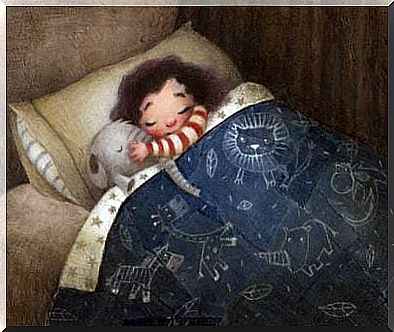What Do You Call A Baby Who Wakes Up At Night? Normal

A baby who wakes up at night several times is usually given a special name in healthcare: a normal child. The sleep cycle of these little ones is sometimes a source of stress, but it is a process that only needs two magical ingredients: time and patience. Children’s brains mature a little at a time.
Many mothers and fathers often believe that babies “must be taught to sleep.” We all know that our children need habits and routines to feel safe, where they can anticipate what is going to happen in every moment and build associations that help them understand the world around them.
When we talk about sleep , however, we are talking about a biological instinct that is still maturing in babies and young children. Over time, babies develop enough for both of you to eventually get 7-9 hours of undisturbed sleep.
If there’s one thing that’s still a mystery, it’s their dreams. There are studies that reveal that a 32-week-old fetus can “dream” when it sleeps in its mother’s womb. But science can not yet explain why there are children who sleep all night and others who can not even sleep for three hours.

We have to pay attention to one detail: it does not matter if the baby is only a few weeks old and that his experience of the world around him is negligible. The basis of the personality is established in the brain of each child, and defines a unique individual with needs that differ from others.
We must therefore be intuitive and receptive to these needs.
When you have a baby who wakes up at night, an atmosphere of anxiety and worry will slowly but surely build up. You wonder if something is wrong with him, if he is ill or if there is something you are doing wrong.
- Never think that you are doing something wrong just because your baby wakes up at night. It is a completely normal process.
- You must realize that life does not always agree with what is written in books. Not all formulas work for everyone, and not all children are the same.
- It is important to understand that a baby is born completely dependent on us. At night, when the lights go out and they are left alone, it is often an anxious and frightening period for children. They are afraid for their own survival. They do not know if you will return, if they have been left alone or if the darkness will last forever.
Almost all behaviors in babies are instinctive. We can not convince them that “nothing will happen” when we leave them in the cradle. The only thing a child understands is the safety of physical contact, of his mother’s voice and the arms that provide protection.
Over time, this fear, like many other purely instinctive roots, will gradually disappear. In the meantime, however, we need a lot of patience and a lot of understanding.

According to neurologists , a child’s brain is fully mature at the age of seven. All nerve cell networks are surrounded by myelin, and their electrical patterns change to make the baby’s dream cycles more regular and nightmares diminish.
We also know that it can be something of a traumatic fact for parents that it will take seven years before their children rest regularly. However, some children do it already at the age of three, and there are many differences from child to child.
Until not so long ago, the classic “Estivill method” was very popular. It claimed that it was recommended to let the baby cry alone in bed until it calmed down. Now, however, the author himself emphasizes the opposite.
- It is not recommended to neglect a crying child, as it leads to unnecessary stress in the child’s brain. It can be relieved with a simple caress, a word or a hug to show that everything is fine.
- You must also understand that there is no “magic” formula for all children. Every mother must discover the most effective method for her child, which over time can change and simplify routines.
- However, it never hurts to remember that children should not be taken to their beds when they are too tired, that naps during the day have a tendency to disturb deep sleep and that toys and shining things over the cradle are stimuli that activate the child’s attention. At night, these are not recommended.

Be patient, respect your child’s own rhythm and understand that it is not always easy to adapt to a world where the light suddenly goes out and you do not understand what is happening or when the parents will return. Months, years and love will give the child all the answers to these uncertainties.









